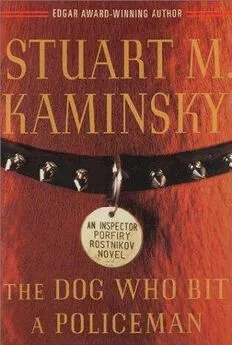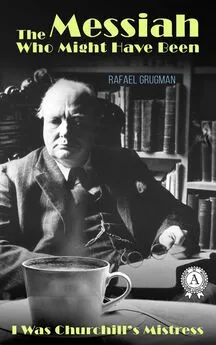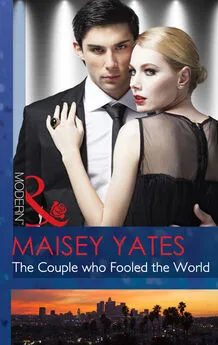Stuart Kaminsky - The Dog Who Bit a Policeman
- Название:The Dog Who Bit a Policeman
- Автор:
- Жанр:
- Издательство:неизвестно
- Год:неизвестен
- ISBN:нет данных
- Рейтинг:
- Избранное:Добавить в избранное
-
Отзывы:
-
Ваша оценка:
Stuart Kaminsky - The Dog Who Bit a Policeman краткое содержание
The Dog Who Bit a Policeman - читать онлайн бесплатно полную версию (весь текст целиком)
Интервал:
Закладка:
Zelach knocked again as Iosef moved to his side so that both men were facing the door when it opened.
“ Kto tahm, who is it?” came a woman’s voice.
“Police. Office of Special Investigation. I am Inspector Rostnikov. I am here with Inspector Zelach.”
“I cannot talk,” the woman said. “I’m going out and I am late.”
“This will be very brief,” said Iosef.
“I don’t. .”
“Then,” said Iosef with a tone of regret, “this may not be so brief.”
“Identification. Under the door.”
Iosef and Zelach knew this routine. They removed their identification cards and slipped them under the door. In truth, the cards proved nothing. They could be purchased for a few thousand rubles, maybe much less with the new currency.
The door opened and a petite, beautiful woman with short blond hair stood before them, one hand holding out the cards to the two men, the other behind her back. She was obviously dressed for the evening in a black tight-fitting dress and costume-jewelry pearls and earrings. Her makeup was minimal and carefully applied. Iosef ’s less-than-successful year as an actor and playwright had taught him about makeup and costumes. This lovely woman was ready for a show.
“Yes?” she asked.
“Police,” said Iosef. “We have a few questions about Yulia Yalutshkin. May we come in?”
“ Vighdyeetyee, come in,” she said, stepping aside, her hand still behind her back.
They walked in, leaving the door open.
“I have no answers,” the woman said. “I don’t know her.”
“How long have you lived here?” asked Iosef pleasantly.
“Three years.”
“Yulia Yalutshkin gave this as her address two years ago.”
“We shared the apartment briefly. I haven’t seen her in. .”
“You can put the gun down,” Iosef said.
The woman looked at the faces of the two detectives, shrugged, and took her hand from behind her back. Both detectives recognized the.22 North American Mini-Revolver. She put the weapon in a small black purse on a nearby coffee table and closed the door.
“This is a dangerous building,” she said.
“It is a dangerous world,” said Iosef.
“I have had to show it more than once,” she said, turning to them and folding her arms, defiant. “I have had to fire it twice. I think I shot one of the three men on the stairs whose unspoken but clear intentions were rape or theft, quite possibly both.”
The apartment was clean, neat, and inexpensively but, to Iosef, tastefully furnished with slightly out of date modern chrome and vinyl furniture. It was a typical Moscow apartment. Small everything. Small living room with an attached little kitchen area. The kitchen was barely big enough to hold a metal-legged table with four chairs around it. The music came from a CD player.
“I don’t have much time,” the woman said, looking at her watch, unfolding her arms, and lighting a cigarette. “So. .” She didn’t offer the two men a seat.
“Yulia Yalutshkin,” said Iosef. “The reputation of an important man, perhaps the life of an important man is in danger, Miss?. .”
“Katerina Bolkonov,” she said. “I really must go soon. There’s a tea dance for Russian women to meet American businessmen looking for wives. If I’m late, I may not be noticed again.”
“We’ll be brief,” said Iosef. Zelach stood at his side, hands folded in front of him. “Does someone else live with you here?”
“My son,” she said. “He’s twelve. He’s at school. If a rich American picks me, my son can move with me to the U.S. and become an American. We can escape this existence.”
“Yes,” said Iosef.
Zelach was silent and impassive. The idea of living anywhere but Moscow seemed vaguely frightening to him. To go to a place where people spoke another language, had strange thoughts and expecta-tions, was almost a nightmare. Torture for Zelach would be telling him he and his mother had to move to someplace like Paris, London, or Boston.
The woman, whose pale skin was smooth, almost perfect, paced the small living room, still smoking, one hand clutching her arm just below the shoulder, kneading it nervously. The woman’s fin-gernails were red, long, and probably artificial. She wanted desperately to catch an American.
“I want no trouble,” she said. “I have a job in a magazine publish-ing office. We publish engineering magazines. I’m just a receptionist-typist, but. .”
“We are not here to give trouble,” Iosef said, assuming from her having shared an apartment with Yulia Yalutshkin that she was also a part-time prostitute. Iosef dreaded going back to the computers and files to check on her background. He hoped it wouldn’t be necessary. “We are just here to ask some simple questions.”
“No questions are simple,” she said suddenly, stopping and facing him. “If I get into trouble, the matchmaking service will drop me. We have to be clean. No drugs. I will have to stop smoking even. These Americans have fantasies. My hair isn’t blond, but that’s what they want, so if I am lucky enough to get an American he will never know.”
“Yulia,” Iosef said. “No one will ever know where the information came from.”
The woman gave a slight laugh, shook her head, took a deep drag of her cigarette, and watched the smoke float lazily from her mouth.
“I knew this would happen someday, something like this. Trouble from you if I don’t tell you. Trouble from them if I do.”
“No one will know who told us whatever you have to tell us,”
Iosef repeated. “There are always many sources for information.”
“All right,” Katerina said with a sigh. “Yulia had a friend. Yulia’s friend was a foreigner, a German, I think. She never gave his name and I stayed away when he came. He always wore black leather and a false smile. He wanted people to think he was Mafia. Maybe he was. I didn’t like him. Once he tried to proposition me. I told Yulia.
She didn’t seem to care. Then one day he came to the door. She was packed. Off they went.”
“Where?”
“Oh, God,” Katerina said. “An apartment on Kalinin. One of those with a doorman. I heard them talking. I heard them talking about how Yulia was going to be some kind of Marta Herring.”
“Mata Hari,” Iosef corrected.
“Yes. She would be a spy. She would seduce secrets from Russians. She would be rich. I heard these things through the door. I did not let them know what I heard. I like Yulia. She was protective, as if I were her sister, and she had lived a difficult life, even more difficult than my own. As beautiful as she was, it was not enough to protect her from the streets. I didn’t like the German. I was afraid for her, but she seemed so excited and she kissed my cheek, hugged me, gave me some money, and promised to stay in touch. I never heard from her again, and when they left, the German stepped back inside this room to put a finger to his lips to let me know that I should be quiet. I have been quiet. It’s getting late.
I can’t be late.”
“You have a photograph of Yulia?” asked Iosef.
Another sigh. Katerina put her cigarette out in a small ashtray on a good-sized glass-top coffee table with chrome legs. “Yes,” she said and moved into the other room of the small apartment.
Iosef looked around and then at Zelach, who had his head down in thought. Iosef wondered what kind of thoughts the man beside him had.
“Here,” Katerina said, hurrying out of the other room.
She handed Iosef a small photograph.
“This was taken just before she left,” said Katerina. “She was all made up for a party. She forgot to take it with her when she left. I meant to give it back when she called, but. .”
Iosef looked at the color photograph, a waist-up picture of a slender, beautiful woman with long dark hair brushed straight back. She wore a dress that revealed her shoulders and a knowing smile that revealed even, white teeth.
“Even when she had little money, Yulia took care of her teeth,”
said Katerina. “She always said, ‘As long as I have good teeth and take care of my face and body, I have a chance to escape from this life.’ She escaped. Keep the photograph. I must leave.”
“You have the address of the apartment building on Kalinin?”
asked Iosef.
“I’ve written it on the back of the photograph,” Katerina said.
“Yulia also spends time at the bar in the Metropole and at the Cafe Royale. The German likes it there.”
Katerina held up her hand to show them the door. She plucked a lightweight coat from a rack in a corner. Iosef pocketed the photo and went through the door with Zelach.
“Please do not come back,” she said softly. “I am afraid of the German; afraid for my son, afraid for me.”
“We won’t come back,” said Iosef, reaching into his pocket, taking out his wallet and removing several bills, which he handed to Katerina. “Take a cab.”
She gave him a long look to determine if he thought this enti-tled him to a return, unofficial visit. She was a good judge of such things. This time she was almost certain that she saw nothing but sympathy in his eyes.
She stuffed the money into her purse and hurried ahead of them, closing the door and putting on the coat. Without glancing back she entered the dark stairwell and went down. The policeman could hear her shoes clapping against the concrete.
“Kalinin Prospekt?” asked Zelach.
“Kalinin,” Iosef answered.
Fifteen minutes later they were at the address of the apartment on Kalinin. The building was tall, relatively new, and sported a uniformed doorman, who was large, pleasant looking, and carrying a weapon which bulged under his gold-buttoned coat.
Iosef and Zelach showed their identification. The man examined the cards carefully and handed them back.
“This woman,” Iosef said, showing him the photograph.
The doorman nodded.
“Miss Yalutshkin,” he said. “She’s not in now. She left less than ten minutes ago.”
“Does she have a guest staying with her now?” asked Iosef. “A man?”
“Miss Yalutshkin entertains a great deal. She also tips well,” said the doorman. “It is my belief that she tips well to insure privacy.
However, if you are asking if anyone is in her apartment now, the answer is no.”
“Do you know this man?” asked Iosef, taking out a photograph of Yevgeny Pleshkov.
The doorman took the picture, looked at it, and said, “Yes, I’ve seen him on the television.”
“Has he ever visited Miss Yalutshkin?” asked Iosef.
“Perhaps,” said the doorman. “I try to mind my own business.”
“So you wouldn’t remember a German who visited her?”
“A German? So many people,” said the doorman. “So many people and such long days. You know it can be very boring being a doorman? I’m not complaining. Except for buying my own uniform, the money and tips are good. But people, tenants, want privacy.”
“Don’t tell her we were looking for her,” said Iosef pleasantly.
“I won’t,” said the doorman.
Another ten minutes later Iosef and Zelach were at the Metropole Hotel directly across from the Bolshoi Theater.
The Metropole was designed in 1898 by an English architect.
Its reputation for elegance has been maintained for a century, and shortly after the revolution, Lenin and his top lieutenants moved into apartments in the one-block-square, four-story stone edifice with its stained-glass windows and marble fountains.
Today the Metropole is part of the Russian-Finnish Inter-Continental Hotels and Resorts. The large rooms were renovated in 1991, but the workmanship and materials were cheap and the rooms are already looking a bit shabby. The suites, however, are well maintained for rich Russians and visiting foreigners drawn by the hotel’s reputation. The suites feature genuine antiques and Oriental carpets.
Читать дальшеИнтервал:
Закладка:










